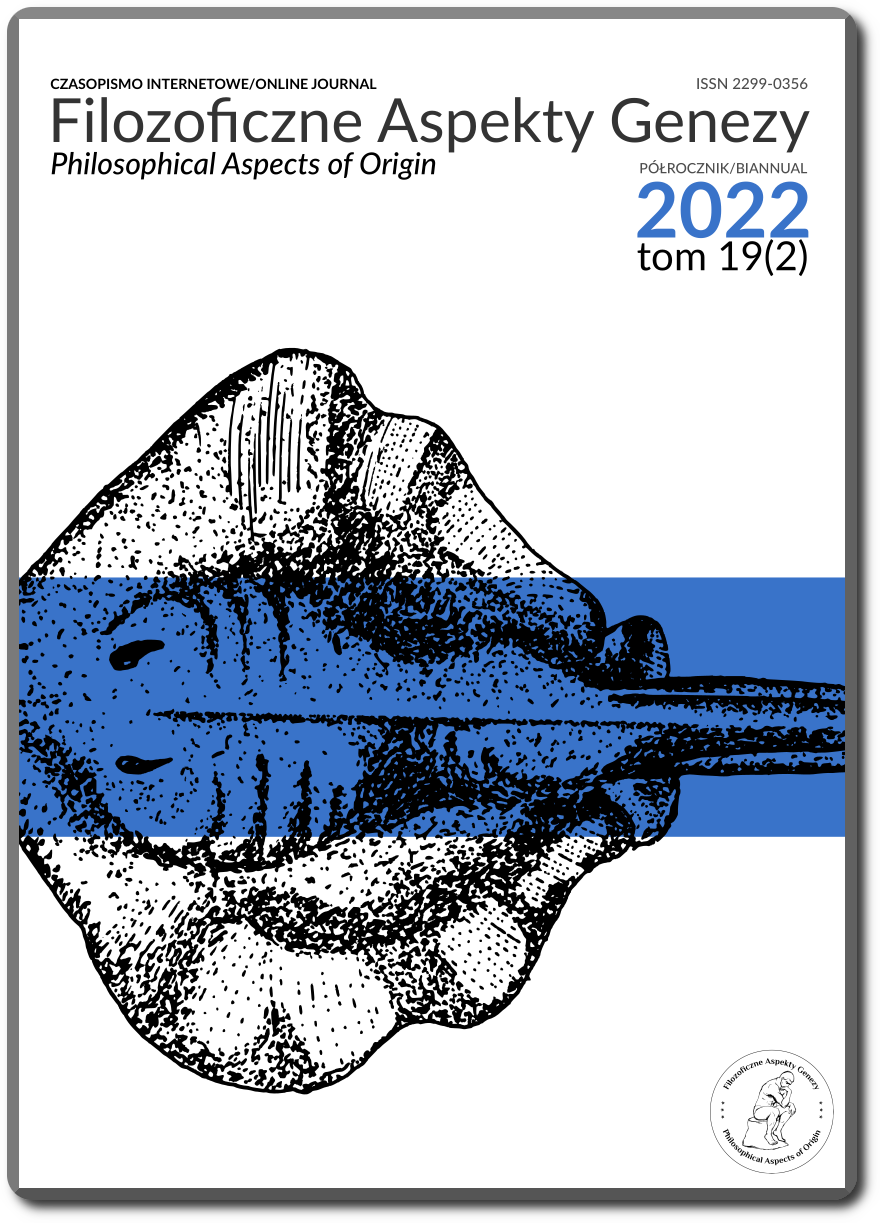Vol 19, No 2 (2022)
Issue Description
Niniejszy tom składa się z sześciu uporządkowanych tematycznie artykułów, trzech listów do redakcji i dwóch recenzji.
W części pierwszej poświęconej interpretacjom darwinizmu zamieszczono cztery artykuły.
Michael Ruse w artykule „Darwin and Design” [Darwin i projekt] twierdzi, że Darwin w pełni akceptował tezę, w myśl której organizmy wyglądają tak, jakby były zaprojektowane. Innymi słowy, że da się w nich odnaleźć „przyczyny sprawcze”. Zdaniem Darwina można to wyjaśnić za pomocą hipotezy doboru naturalnego. Ruse twierdzi, że zaprzeczał on jednak, że wyjaśnienia cech organizmów wymagają hipotezy o świadomym zaprojektowaniu. Czytaj tekst...
J. Scott Turner w artykule „Do Species Want to Evolve?” [Czy gatunki chcą ewoluować?] udziela pozytywnej odpowiedzi na to pytanie. Jego zdaniem zasadnicza teza darwinizmu, że tylko niekierowany proces doboru naturalnego może wytwarzać nowe gatunki, jest błędna. Autor twierdzi, że adaptacja i pamięć dziedziczna są zjawiskami celowymi, a to, jego zdaniem, podważa ideę niekierowanego doboru naturalnego. Czytaj tekst...
Stephen Dilley w artykule „Rola teologii w książce Karola Darwina O powstawaniu gatunków” uzasadnia tezę, że teologia odgrywała istotną rolę w formułowaniu naukowych poglądów Darwina przedstawionych w jego dziele. Tezę tę uzasadnia za pomocą analiz teologicznego języka, jakim posługiwał się Darwin. Zdaniem autora, Darwin użył teologii pozytywnej, aby uzasadnić teorię dziedziczenia z modyfikacjami i podważyć ideę specjalnego stworzenia. Czytaj tekst...
Michał Jakub Wagner w artykule „The Liminal Nature of the »Eclipse of Darwinism« as a Critical Phase in the History of Evolutionary Biology” ["Liminalny charakter "zaćmienia darwinizmu" jako krytycznego etapu w historii biologii ewolucyjnej"] twierdzi, że dotychczasowe interpretacje „zaćmienia darwinizmu” mają poważny problem z wyjaśnieniem takiego rozwoju paradygmatu darwinowskiego, w ramach którego najpierw Darwin zmienia kierunek rozwoju biologii, następnie jego ujęcie zostaje odrzucone na rzecz teorii niedarwinowskich, a w końcu powstaje nowoczesna synteza. Zdaniem autora za taki stan rzeczy odpowiedzialne jest powszechnie podzielane przekonanie, że zawsze istniała jedna główna linia rozwoju naukowego, w której nie było miejsca na okres nieokreśloności — czyli taki, w którym nauka nie była zdominowana przez jedną perspektywę badawczą. Czytaj tekst...
Część druga, poświęcona podstawom nowożytnej nauki, zawiera dwa artykuły.
Michael Esfeld w artykule „The Metaphysics of Cartesian Science” [Metafizyka nauki kartezjańskiej] omawia kwestię, w jaki sposób nauka kartezjańska osiąga obiektywizm. Następnie autor koncentruje się na zagadnieniu rozwoju nowożytnej nauki. W drugiej części artykułu Esfeld przedstawia argumentację, wyjaśniającą dlaczego nauka kartezjańska napotyka na przeszkodę, jaką jest ludzka myśl i działanie. Pozwala mu to na dokonanie oceny kartezjańskiego dualizmu. Czytaj tekst...
Gonzalo Munévar w artykule „The Origin of Modern Physical Science: Some Passages from A Theory of Wonder” [Pochodzenie współczesnych nauk przyrodniczych. Wybrane fragmenty z Teorii zdziwienia] przedstawia główne argumenty swojej najnowszej książki A Theory of Wonder: Evolution, Brain, and the Radical Nature of Science [Teoria zdziwienia. Ewolucja, mózg i radykalna natura nauki] oraz zarys, rozwijanej we wspomnianej książce, teorii, nazwanej przez niego ewolucyjnym relatywizmem. Artykuł ten jest rzadką w dzisiejszych czasach próbą obrony relatywizmu epistemologicznego na bazie Feyerabendowskiej zasady proliferacji. Ta ostatnia zaleca wymyślanie alternatywnych punktów widzenia i na ich podstawie badanie tego, co uznawane jest za istotne świadectwa. Czytaj tekst...
Tom kończą trzy listy do redakcji i dwie recenzje.
Bradley Monton w liście do redakcji zatytułowanym „How Can an Atheist Defend Intelligent Design?” [Jak ateista może bronić teorii inteligentnego projektu?] wspomina swoje intelektualne utarczki z ludźmi ze środowiska naukowego, którzy nie byli w stanie zrozumieć, że można poważnie traktować teorię inteligentnego projektu nie będąc jej zwolennikiem. Czytaj tekst...
W liście do redakcji zatytułowanym „The Inference to Intelligent Design is Independent of Any Religious Claim: The Wonder of Water” [Wnioskowanie o projekcie jest niezależne od jakichkolwiek twierdzeń religijnych. Zadziwiające właściwości wody] Michael Denton wyjaśnia, dlaczego nawet dla agnostyka, biorąc pod uwagę świadectwa na dostrojenie środowiska do życia istniejącego na Ziemi, odrzucenie tezy o zaprojektowaniu jest sprawą bardzo trudną. Argumenty swoje opiera na różnych własnościach wody, te ostatnie zaś pozwalają autorowi twierdzić, że woda została dostrojona do życia istniejącego na Ziemi. Czytaj tekst...
Cornelius Hunter w liście do redakcji zatytułowanym „What Monton Seems to Miss?” [Czego nie zauważa Monton?] twierdzi, że Bradley Monton apeluje do teistów i ateistów, by zgodzili się na jego stwierdzenie, że nauka może w zasadzie dostarczyć świadectw na rzecz istnienia projektu w przyrodzie. Jednakże, zdaniem Huntera, Monton zdaje się nie zauważać, że dwie kluczowe dla jego argumentacji kwestie: powstawania gatunków i kontrowersja przypadek versus projekt są mocno obciążone teologicznie i metafizycznie, a to teologiczne i metafizyczne obciążenie kształtuje treść przekonań naukowych. Czytaj tekst...
Hicham Jakha w recenzji książki Janet Levin The Metaphysics of Mind [Metafizyka umysłu] (Cambridge University Press, Cambridge — New York 2022), zatytułowanej „From Mind to Body and Back” [Tam i z powrotem, czyli od umysłu do ciała] nie tylko przedstawia czytelnikowi obszerne i ciekawe omówienie tej książki, ale zauważa też, że Levin nie przebadała kilku ważnych teorii umysłu. Mimo tego, jak podkreśla autor recenzji, książka cechuje się „filozoficznym rygorem i głębią”, co pozwala polecić ją każdemu zainteresowanemu tą problematyką czytelnikowi. Czytaj tekst...
Albert Łukasik w recenzji książki Jacka Neckara Ewolucyjna psychologia osobowości. O psychologicznej naturze człowieka w ujęciu darwinowskim (Wydawnictwo Akademickie SEDNO, Warszawa 2018) zatytułowanej „Człowiek zwierzęciem zróżnicowanym” najpierw wskazuje na trzy zasadnicze cele jakie przyświecały Neckarowi przy pisaniu jego monografii. Następnie autor recenzji dokładnie omawia treść sześciu rozdziałów książki. Pozwala mu to na stwierdzenie, że monografia Neckara nie tylko porusza najistotniejsze zagadnienia z psychologii ewolucyjnej i psychologii osobowości, ale książka ta jest oryginalną próbą syntezy licznych teorii osobowości z wyjaśnieniami ewolucjonistycznymi. Czytaj tekst...



